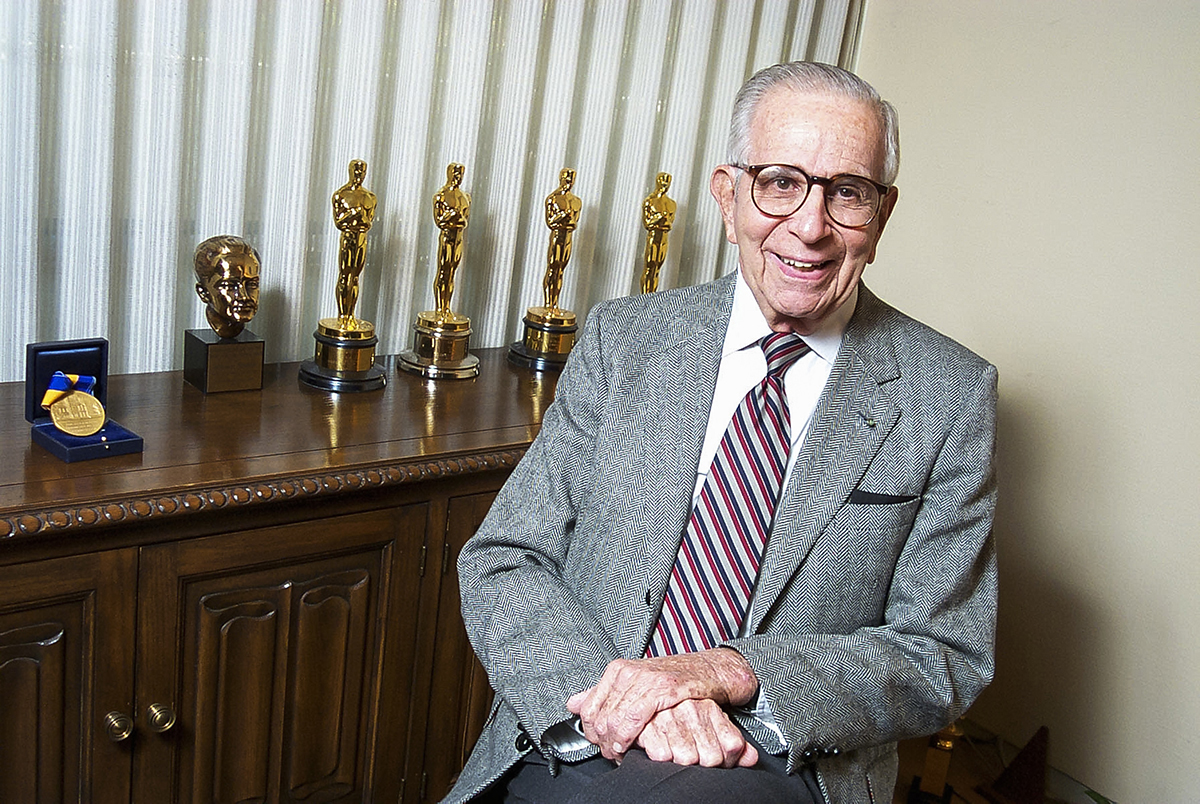A Movie Mogul’s Big Break
Walter Mirisch ’42 transcended humble origins to produce classic Hollywood films.

Aliens, gunslingers, and singing street gangs: Mirisch created movies that helped shape American culture. Jeff Miller
“From the time I was very young and saw my first film, I thought, what a wonderful way that might be to spend one’s life,” says Walter Mirisch ’42. “But like most young people, I thought, that is so far distant from my present world I don’t know how I can ever manage to accomplish that.”
For Mirisch, that “present world” was a poor adolescence in New York City during the Great Depression. In 1940, his father, a Polish immigrant, finally gave up on his struggling business, and the family moved to Milwaukee. Mirisch, then a student at the City College of New York, dropped out to join them. A chance visit to Madison inspired him to resume his education at the UW, where he majored in history and debated a future in law or graduate studies. He made his decision when the history chair told him no university would ever hire a Jewish scholar. Mirisch left Madison for Harvard Business School.
A heart murmur kept him out of the navy, but Mirisch was still eager to serve his country during World War II. He moved to Burbank, California, to work at a bomber-plane plant and write technical articles to share knowledge with other military manufacturers. After the war ended, though, Mirisch immediately turned his attention to his original passion: the movies.
His brother had connections that led Mirisch to his first job at Monogram, a low-budget studio that shot movies in as few as eight days and for as little as $100. Right away, he began to nag his boss for a chance to make a movie of his own. “My argument was simply that I could do it better than the people who were then doing it,” he says.
It didn’t take long for Mirisch to get his big break, and by age 29, he was running production at Monogram. The 1956 science-fiction classic Invasion of the Body Snatchers was his first substantial success, and in 1957, Mirisch and brothers Harold and Marvin formed the Mirisch Company to produce films for United Artists.
The Mirisch Company became a dynamo in the 1960s. Three of its movies won the Oscar for best picture: The Apartment (1960), West Side Story (1961), and In the Heat of the Night (1967). Mirisch also produced The Magnificent Seven (1960), a big-budget action movie that ushered in a new era for westerns.
Mirisch has won numerous awards, including Hollywood’s top honor for producers and a humanitarian award. But one that holds special significance for him is the honorary doctorate that UW–Madison bestowed in 1989. “[Wisconsin] gave me what I felt was a marvelously well-rounded education that gave me a background to deal with all kinds of subjects in what later became my career in filmmaking,” he says. Mirisch was also instrumental in founding the Hollywood Badgers, a group that connects young UW alumni to careers in movie-making.
During a visit back to campus, then-chancellor John D. Wiley MS’65, PhD’68 joked that Mirisch should write a book about his memories of Hollywood. “I have written a book. It’s in my closet,” Mirisch replied, and Wiley told him, “Well, you know, we have a press here.” In 2008, the University of Wisconsin Press released Mirisch’s memoir, I Thought We Were Making Movies, Not History.
In all, Mirisch has produced 96 films and television episodes, along with dozens of documentary shorts, television specials, and other projects. His pictures have garnered 87 Oscar nominations and 28 wins. Most recently, he served as executive producer on the 2016 remake of The Magnificent Seven.
Published in the Fall 2021 issue



Comments
No comments posted yet.